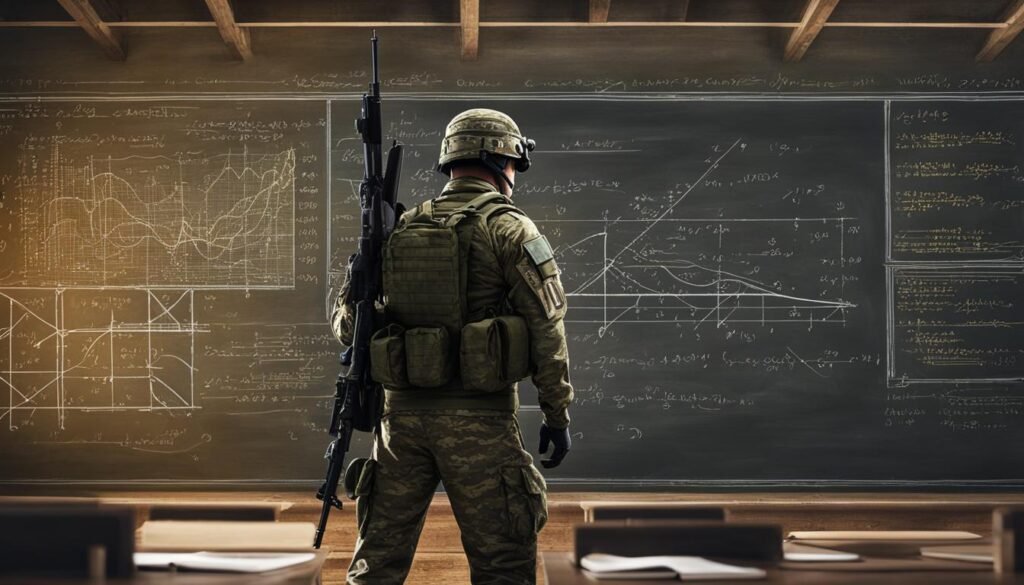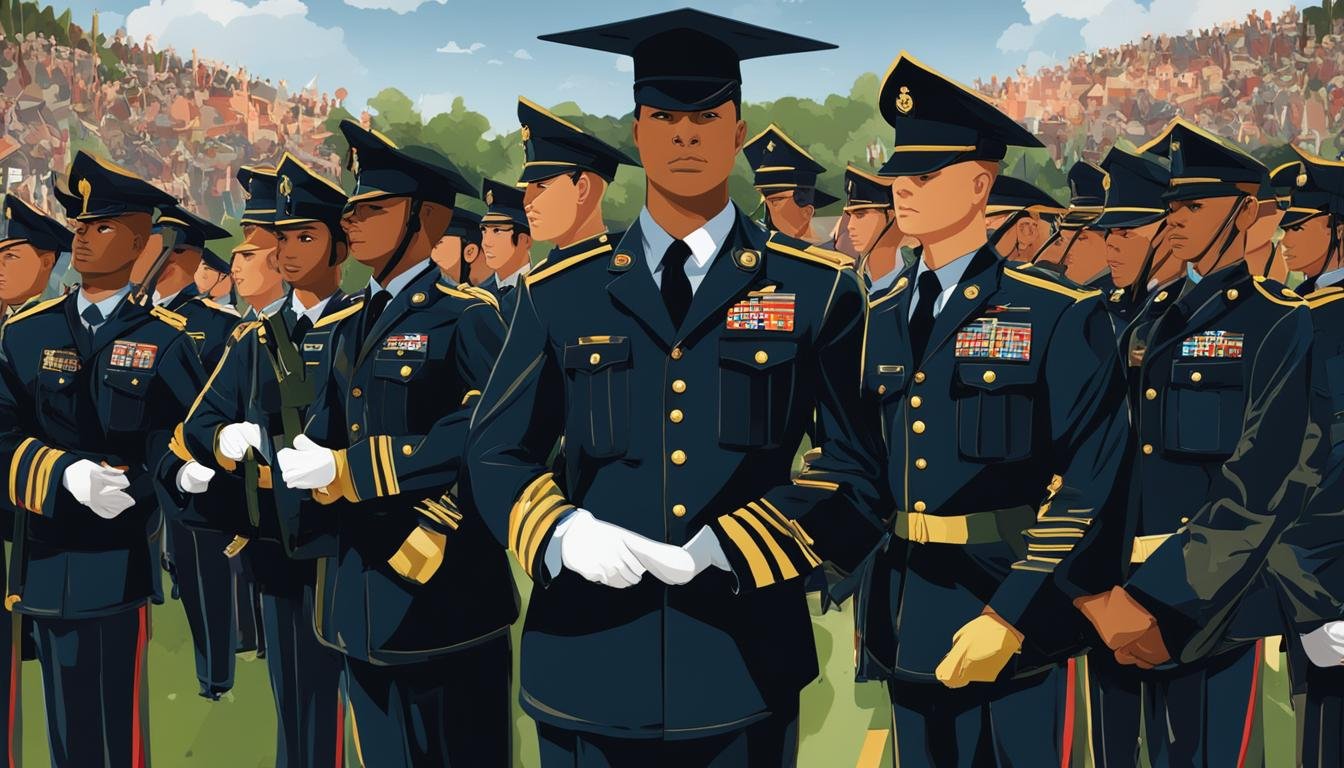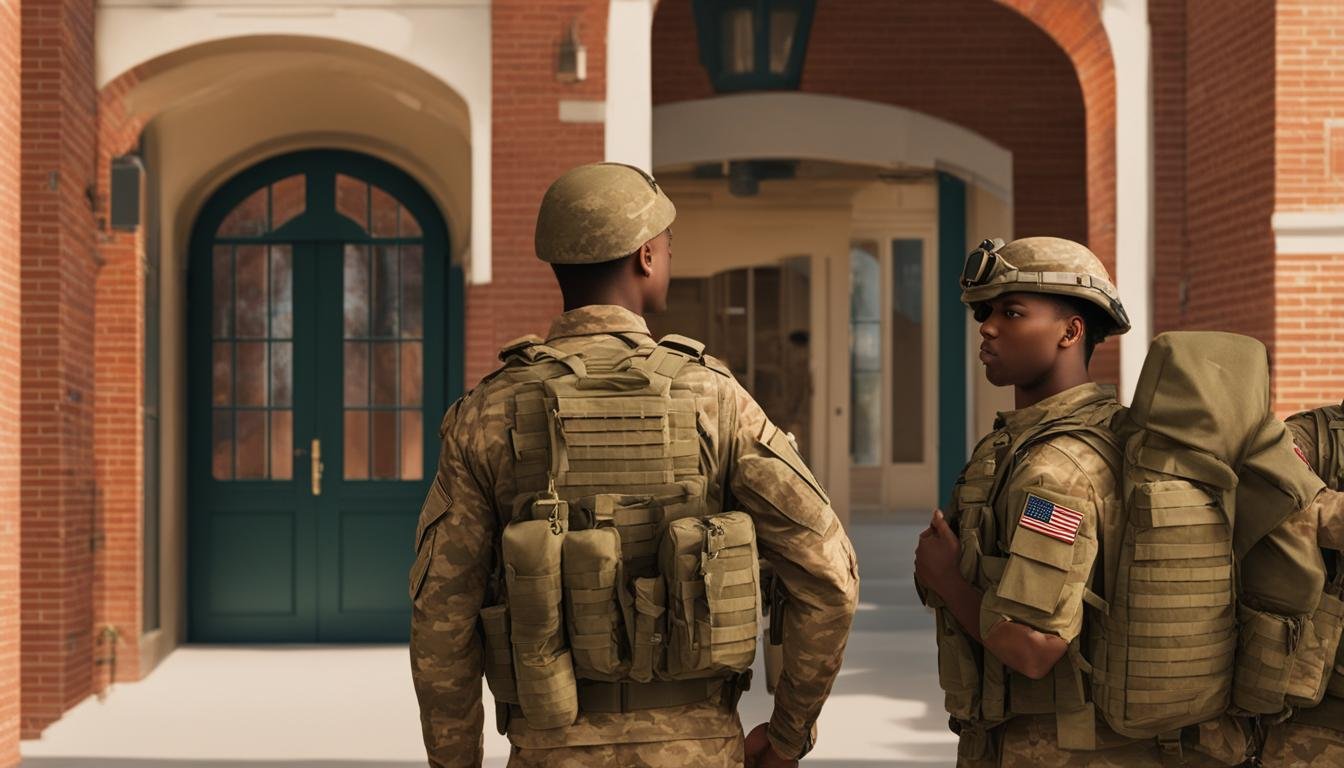Military training has a significant impact on academic advancement and success. Numerous studies have shown that military education enhances intellectual growth and improves academic performance among servicemembers. For example, a study conducted by California State University, Monterey Bay found that children with military parents often face unique challenges that can affect their academic performance. This highlights the importance of understanding the effects of the military lifestyle on education and providing support to military children in the classroom.
Key Takeaways:
- Military training has a positive impact on academic performance.
- Military education instills discipline and self-discipline, contributing to academic success.
- Problem-solving and critical thinking skills acquired through military training can be applied to academic tasks.
- The leadership and teamwork abilities fostered in military training are transferable to academic settings.
- Military experience can enhance classroom discussions and contribute to a more diverse learning environment.
The Benefits of Military Training on Academic Performance

Military training provides several benefits that contribute to improved academic performance. Firstly, military education instills discipline and self-discipline, which are essential qualities for academic success. The structured and rigorous nature of military training helps students develop strong study habits and time management skills. Additionally, the problem-solving and critical thinking skills acquired through military training can be directly applied to academic tasks and challenges.
Moreover, the leadership skills and teamwork abilities fostered in military training are transferable to group projects and collaborative learning environments in academic settings. Effective teamwork and leadership are vital for achieving academic success and maximizing learning outcomes. Military training equips students with the ability to work well with others, communicate effectively, and take on leadership roles when necessary.
Furthermore, military training enhances adaptability and resilience. Servicemembers are often exposed to demanding situations that require them to think on their feet, adapt to changing circumstances, and overcome obstacles. These skills are invaluable in the academic realm, where students may encounter unexpected challenges and need to quickly adjust their approach to achieve their goals.
The Benefits of Military Training on Academic Performance:
- Instills discipline and self-discipline.
- Develops strong study habits and time management skills.
- Improves problem-solving and critical thinking abilities.
- Enhances leadership skills and teamwork abilities.
- Builds adaptability and resilience.
In summary, military training offers numerous advantages for academic performance. It fosters discipline, teaches effective study habits, and enhances problem-solving and critical thinking skills. Additionally, military training develops leadership and teamwork abilities, which are essential for success in academic settings. Furthermore, the adaptability and resilience cultivated through military training are valuable traits that can contribute to academic success. Overall, the benefits of military training provide servicemembers with a strong foundation for achieving their educational goals.
The Role of Military Experience in Educational Advancement

Military experience plays a crucial role in driving educational advancement and career opportunities. The skills, knowledge, and mindset gained through military training can greatly benefit individuals seeking higher education or professional growth. Military veterans bring unique perspectives and valuable real-world experiences to the academic setting, enhancing classroom discussions and promoting a diverse learning environment.
One of the key advantages of military experience in education is the development of strong leadership and organizational skills. The military fosters a culture of teamwork, discipline, and responsibility, which can be translated into successful academic pursuits. These qualities enable veterans to excel in group projects, collaborate effectively with peers, and manage their time efficiently.
Furthermore, the problem-solving and critical thinking abilities honed in military training directly contribute to academic success. Veterans are trained to analyze complex situations, make informed decisions, and adapt to changing circumstances. These skills are highly transferable to the academic realm, empowering veterans to tackle challenging coursework and excel in research or problem-solving-oriented fields.
Overall, military experience serves as a powerful catalyst for educational and career growth. By leveraging the skills and mindset obtained through military training, veterans can achieve remarkable educational advancements and thrive in their chosen professions.
The Benefits of Military Experience in Education
The benefits of military experience in education are not limited to academic performance alone. Veterans often bring a strong work ethic, discipline, and determination to succeed, which are qualities highly valued by employers. Military experience can provide a competitive edge in the job market and open doors to various career opportunities.
Furthermore, veterans may also be eligible for educational benefits and financial assistance, such as the GI Bill, which can alleviate the financial burden of pursuing higher education. These benefits, combined with the skills and experiences gained through military service, create a powerful foundation for educational advancement and long-term career success.
| Benefits of Military Experience in Education | Explanation |
|---|---|
| Leadership Development | Veterans possess strong leadership skills, allowing them to excel in group projects and take on leadership roles within academic and professional settings. |
| Discipline and Time Management | The structured nature of military training instills discipline and time management skills, enabling veterans to effectively balance their academic responsibilities while pursuing higher education. |
| Problem-Solving and Critical Thinking | Military experience equips veterans with the ability to analyze complex situations, think critically, and find innovative solutions, all of which are valuable skills in academic and professional environments. |
| Work Ethic and Determination | Veterans bring a strong work ethic and a sense of determination to succeed, which can positively influence their academic performance and professional endeavors. |
How Does Military Service Affect Academic Advancement?
The impact of military service on academic advancement can vary depending on individual circumstances. Some may find that military experience enhances their discipline and time management skills, leading to improved academic performance. However, others may struggle to balance their military obligations with their academic responsibilities, potentially impacting their progress in school.
Conclusion
Military training plays a critical role in academic advancement and success. The structured nature of military education, combined with the development of essential skills such as critical thinking, problem-solving, leadership, and teamwork, contributes to improved academic performance. Servicemembers benefit greatly from the disciplined environment of military training, which fosters strong study habits and time management skills. These attributes transfer directly to the academic setting, enabling military students to excel in their educational pursuits.
Military experience brings unique perspectives and real-world knowledge to the classroom, enriching educational outcomes. The skills and leadership qualities acquired during military service can enhance discussions, promote diversity, and create a more enriched learning environment. As more servicemembers pursue higher education opportunities, it is crucial to recognize the benefits and challenges associated with military training.
Recognizing and supporting the academic endeavors of military students is essential for their success. Educators and institutions must strive to understand the impact of military training on academic advancement. By doing so, they can provide the necessary support and resources to ensure that military students thrive in their educational journey. Together, we can empower military students to achieve their academic goals and contribute to the greater success of our educational system.



